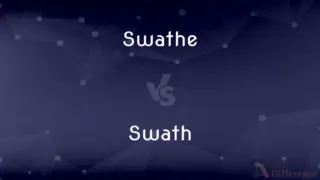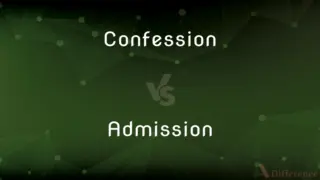Acting vs. Lying — What's the Difference?
Edited by Tayyaba Rehman — By Fiza Rafique — Updated on March 30, 2024
Acting involves assuming a role or character to tell a story, while lying is deceiving with the intention to mislead or hide the truth.

Difference Between Acting and Lying
Table of Contents
ADVERTISEMENT
Key Differences
Acting is a creative and performative art where individuals embody characters to convey stories or express emotions, often in theater, film, or television. It's based on skillful portrayal and empathy, aiming to entertain, educate, or evoke emotions without intent to deceive on a personal level. Lying, on the other hand, is a deliberate attempt to make someone believe something that is not true, often for personal gain or to avoid negative consequences. It involves a breach of trust and is generally considered unethical.
While acting requires an understanding of character and scenario, often involving rehearsal and direction, lying is typically spontaneous and used in personal or professional contexts to mislead. The key distinction lies in the intent and context: actors openly acknowledge their role as a performance, whereas liars conceal their deceitful intentions.
In acting, authenticity and believability are valued, even though the audience is aware that the portrayal is not real. Conversely, lying seeks to create a false sense of truth, manipulating the perception of reality without the consent or awareness of the deceived.
Actors often study human behavior and psychology to accurately depict a wide range of emotions and situations, relying on technique and empathy. Lying, however, exploits these understandings to fabricate a believable falsehood, aiming to manipulate rather than to entertain or inform.
The reception of both actions differs significantly: acting, when skillfully executed, is celebrated and appreciated for its artistry and ability to communicate complex human experiences. Lying, in contrast, is typically met with disapproval and distrust, undermining relationships and credibility.
ADVERTISEMENT
Comparison Chart
Purpose
To portray a character or story for entertainment, education, or emotional expression
To deceive or mislead someone for personal gain or to avoid consequences
Intent
Creative expression and storytelling without intent to deceive
Deliberate falsehood with intent to deceive
Context
Theater, film, television, and other performance arts
Personal, social, and professional contexts
Audience Awareness
Audience is aware it’s a performance
Intended to be believed as truth by the deceived
Ethical Consideration
Considered an art form and profession
Generally viewed as unethical and damaging
Compare with Definitions
Acting
Embodying a role to convey a story or emotions.
His acting brought the character to life.
Lying
Intentionally making a false statement to deceive.
He was caught lying about his whereabouts.
Acting
A profession involving portraying various characters.
He pursued acting as his lifelong career.
Lying
Generally considered unethical and harmful.
Lying is frowned upon in most cultures.
Acting
Performance that requires understanding human emotions and scenarios.
Effective acting often demands deep empathy.
Lying
A tactic to avoid negative consequences.
He considered lying to avoid punishment.
Acting
The art of performing as a character in films, theater, or television.
She studied acting at the prestigious drama school.
Lying
Misleading someone for personal benefit.
Lying on her resume landed her in trouble.
Acting
Acknowledged as a form of creative expression.
Her acting was recognized with several awards.
Lying
Presenting false information as truth.
Lying undermines trust in relationships.
Acting
Acting is an activity in which a story is told by means of its enactment by an actor or actress who adopts a character—in theatre, television, film, radio, or any other medium that makes use of the mimetic mode. Acting involves a broad range of skills, including a well-developed imagination, emotional facility, physical expressivity, vocal projection, clarity of speech, and the ability to interpret drama.
Lying
Present participle of lie1.
Acting
Temporarily assuming the duties or authority of another.
Lying
To be or place oneself at rest in a flat, horizontal, or recumbent position; recline
He lay under a tree to sleep.
Acting
The occupation of an actor.
Lying
To be placed on or supported by a surface that is usually horizontal
Dirty dishes lay on the table. See Usage Note at lay1.
Acting
Performance as an actor.
Lying
To be or remain in a specified condition
The dust has lain undisturbed for years. He lay sick in bed.
Acting
Temporarily assuming the duties or authority of another person when they are unable to do their job.
The Acting Minister must sign Executive Council documents in a Minister's absence.
The CEO is currently in a hospital. The CFO is acting CEO in the meantime.
Lying
To exist; reside
Our sympathies lie with the plaintiff.
Acting
Present participle of act
Lying
To consist or have as a basis. Often used with in
The strength of his performance lies in his training.
Acting
An action or deed.
Lying
To occupy a position or place
The lake lies beyond this hill.
Acting
(legal) Something done by a party — so called to avoid confusion with the legal senses of deed and action.
Lying
To extend
Our land lies between these trees and the river.
Acting
Pretending.
Lying
To be buried in a specified place.
Acting
(drama) The occupation of an actor.
Lying
(Law) To be admissible or maintainable.
Acting
Operating in any way.
Lying
(Archaic) To stay for a night or short while.
Acting
Doing duty for another; officiating; as, an acting superintendent.
Lying
Present participle of lie2.
Acting
The performance of a part or role in a drama
Lying
To present false information with the intention of deceiving.
Acting
Serving temporarily especially as a substitute;
The acting president
Lying
To convey a false image or impression
Appearances often lie.
Lying
To say or write as a lie.
Lying
The manner or position in which something is situated.
Lying
A haunt or hiding place of an animal.
Lying
(Sports) The position of a golf ball that has come to a stop.
Lying
A false statement deliberately presented as being true; a falsehood.
Lying
Something meant to deceive or mistakenly accepted as true
Learned his parents had been swindlers and felt his whole childhood had been a lie.
Lying
Disposed to or characterized by untruth
A lying witness.
Lying
Present participle of lie.
Lying
Present participle of lie.
Lying
Simple past tense and past participle of lye
Lying
The act of one who lies, or keeps low to the ground.
Lying
An act of telling a lie or falsehood.
Lying
Tending to tell lies, untruthful, mendacious
Lying
Of Lie, to tell a falsehood.
Lying
Of Lie, to be supported horizontally.
Lying
The deliberate act of deviating from the truth
Lying
Given to lying;
A lying witness
A mendacious child
Common Curiosities
What is the primary goal of acting?
The primary goal of acting is to tell a story or convey emotions through the portrayal of characters, aiming to entertain, educate, or evoke an emotional response.
What skills are important for acting?
Important skills for acting include empathy, vocal and physical expressiveness, creativity, memorization, and the ability to understand and embody characters.
Why do people lie?
People lie to deceive or mislead others, often for personal gain, to protect themselves or others, or to avoid negative outcomes.
How does society view acting and lying?
Society views acting as a respected art form and profession, while lying is generally considered unethical and damaging to personal and professional relationships.
Do actors ever use lying in their profession?
Actors may use techniques to make their performances more believable, but this is done within the context of their role and with the understanding that it is a performance, not to deceive in a harmful manner.
How do actors prepare for roles that are morally complex or involve deceit?
Actors prepare for such roles by researching, understanding the character's motivations, and using their skills to portray the character authentically without endorsing the character's actions.
Can lying ever become a habit?
Yes, lying can become a habit if it is repeatedly used as a coping mechanism or way to achieve desired outcomes, potentially leading to more significant ethical and social problems.
Is lying ever justified?
Some argue that lying can be justified in certain situations, such as to protect someone from harm, but it often leads to ethical dilemmas and trust issues.
How can one distinguish between acting and lying in real life?
Distinguishing between acting and lying in real life involves understanding the intent, context, and whether there is an element of deceit intended to mislead someone for personal gain.
Can acting be considered lying?
While acting involves portraying roles that are not the actor’s own, it is not considered lying because it is done with the audience’s awareness and consent for artistic purposes.
How does one rebuild trust after lying?
Rebuilding trust after lying involves acknowledging the lie, expressing genuine remorse, and taking consistent actions over time to demonstrate honesty and reliability.
What are the consequences of lying?
The consequences of lying can include loss of trust, damaged relationships, legal penalties, and a negative impact on one's personal and professional reputation.
Are there cultural differences in how lying is perceived?
Yes, cultural norms and values can influence how lying is perceived, with some cultures having stricter views on honesty and integrity than others.
What role does empathy play in acting?
Empathy plays a crucial role in acting, as it enables actors to understand and portray the emotional experiences of their characters, making their performances more authentic and relatable.
What impact does lying have on society?
Lying can erode trust, damage relationships, and undermine social cohesion, leading to a society where truth and honesty are devalued.
Share Your Discovery

Previous Comparison
Swathe vs. Swath
Next Comparison
Confession vs. AdmissionAuthor Spotlight
Written by
Fiza RafiqueFiza Rafique is a skilled content writer at AskDifference.com, where she meticulously refines and enhances written pieces. Drawing from her vast editorial expertise, Fiza ensures clarity, accuracy, and precision in every article. Passionate about language, she continually seeks to elevate the quality of content for readers worldwide.
Edited by
Tayyaba RehmanTayyaba Rehman is a distinguished writer, currently serving as a primary contributor to askdifference.com. As a researcher in semantics and etymology, Tayyaba's passion for the complexity of languages and their distinctions has found a perfect home on the platform. Tayyaba delves into the intricacies of language, distinguishing between commonly confused words and phrases, thereby providing clarity for readers worldwide.











































